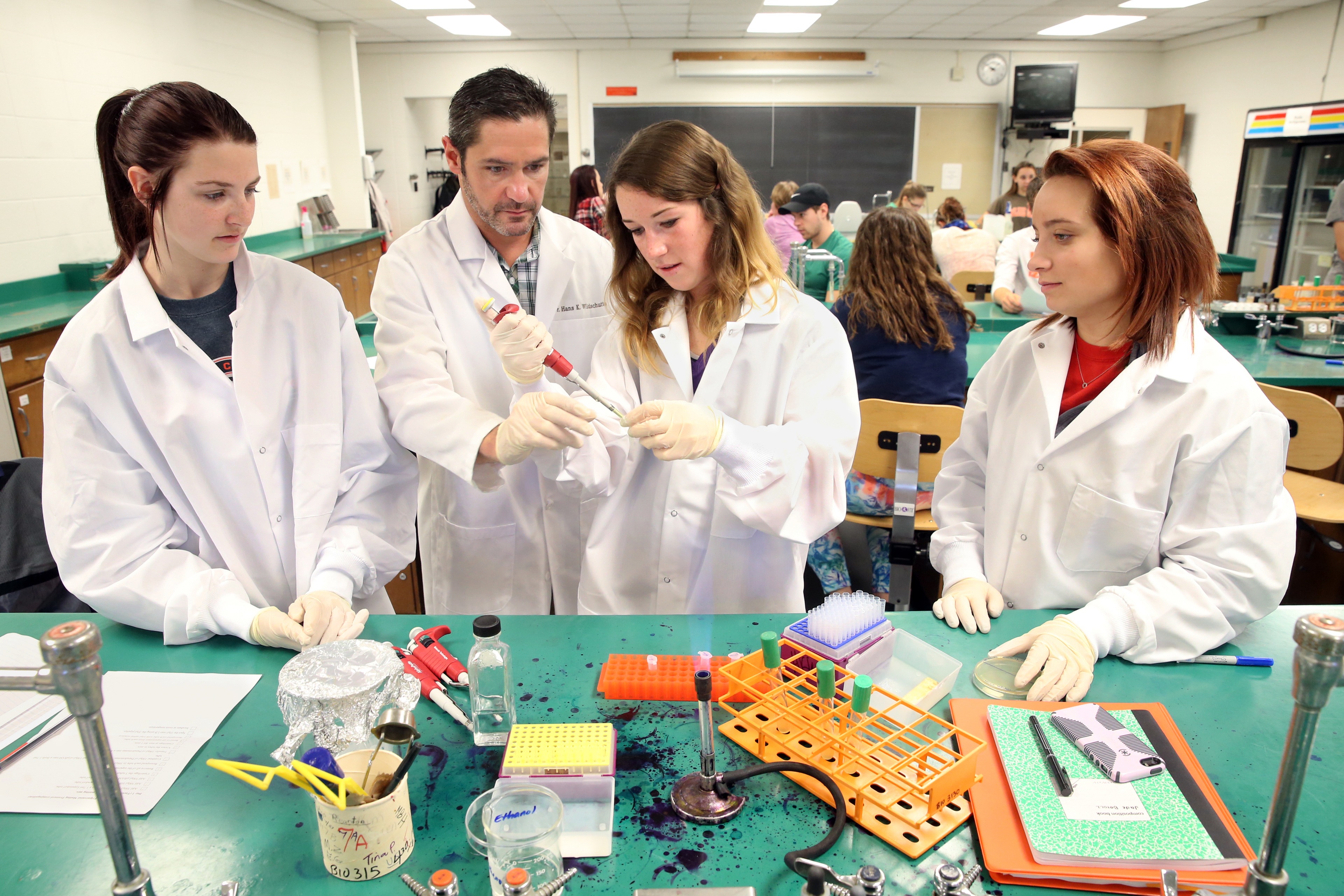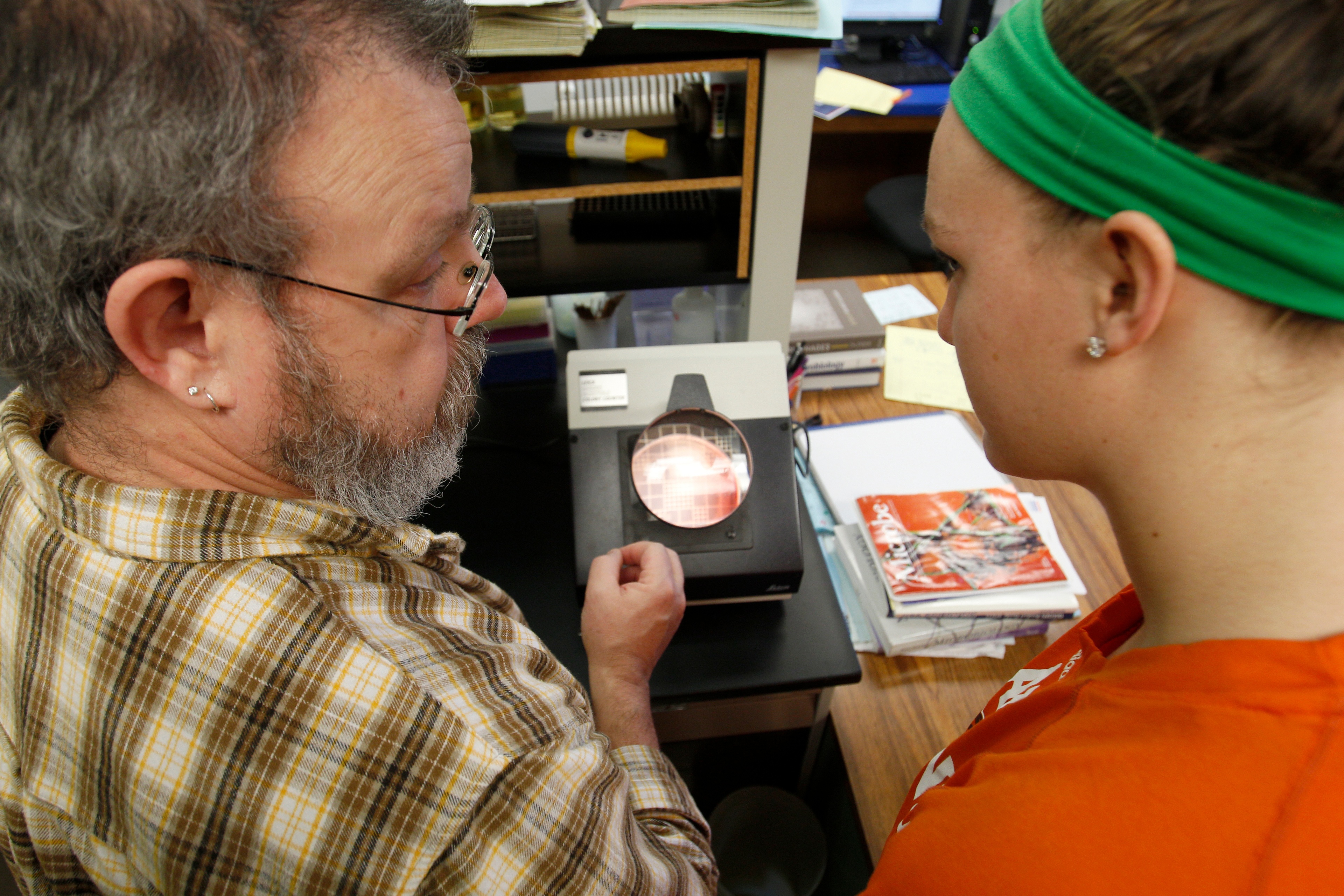Nationally recognized for student experience
The Wall Street Journal

Bachelor of Science (B.S.)
Microbiology
Earn a microbiology degree from Bowling Green State University and discover how the study of the smallest organisms can have the biggest impacts. Those in microbiology jobs apply intricate knowledge of these tiny life forms to address global problems.
The skills of a microbiologist can prove vital in scientific breakthroughs, from developing life-saving vaccines to creating climate change solutions to revolutionizing food safety and security.
Many BGSU microbiology graduates work in the medical or pharmaceutical industries, studying pathogens and treatments. Others research genetics or biotechnology, identifying innovative solutions to dangerous conditions. Some microbiology jobs focus more heavily on environmental science, studying microorganisms that play crucial roles in everything from soil health to harmful algal blooms to wastewater treatment.
Explore the vast career possibilities at BGSU, one of the best colleges for microbiology in the Midwest.
Why study microbiology at BGSU in Ohio?
- Stellar reputation. Microbiology experts in the BGSU Department of Biological Sciences have been recognized for outstanding contributions to education and research.
- Small class size. Class sizes for microbiology majors at BGSU are intentionally small and lead to more personalized instruction and mentorship opportunities.
- Outstanding faculty. BGSU microbiology faculty are nationally recognized and conduct research of international significance. Biological sciences faculty generate 50 peer-reviewed biology research publications and more than $1 million in external grant funding annually.
- State-of-the-art learning facilities. Most classes are offered in the Life Sciences Building, a 5-story, 120,000-square-foot research and teaching complex with over 40 laboratories. These include top-of-the-line microbiology laboratories and classrooms with access to light and electron microscopes, ultraviolet and visible light spectrophotometers, imaging equipment, micromanipulators, incubators, electrophoresis and pulse-field gel equipment, thermocyclers and computers.
- Undergraduate research opportunities. Many universities limit prime research opportunities to graduate students. Not BGSU. Undergraduate microbiology degree majors are encouraged to participate in research projects, field research studies and internships.
- Close colleague connections. The BGSU Alpha Beta chapter of Tri-Beta (Beta Beta Beta National Biological Honor Society) helps biological sciences students build connections through research symposiums, nature walks, local science fairs, independent research projects, guest lectures, internship panels and tutoring services. There’s also the BGSU American Society for Microbiology (ASM) Chapter.
The job outlook for microbiologists is expected to grow 7% faster than the national average for other career fields.
U.S. Bureau of Labor Statistics
#1 public university in Ohio for career prep
The Wall Street Journal
Career - what can you do with a microbiology degree?
Microbiology graduates are in high demand at:
- Universities
- Pharmaceutical companies
- Healthcare facilities
- Agriculture operations
- Biotechnology firms
- Government agencies and beyond
Microbiology majors often go on to pursue careers in research, epidemiology, medicine and dentistry. Others work in laboratories as technicians or enter the field of medical technology.
Top employers of microbiologists include the food/pharmaceutical industries and hospital/government laboratories. These microbiologists are typically tasked with monitoring and researching medicines, food safety, water quality and biotechnology.
It’s possible to launch a successful career with an undergraduate microbiology degree, but graduates often go on to earn their master’s in microbiology, molecular biology, genetic engineering or other related fields. An advanced degree allows graduates to step directly into high-paying leadership roles.
Career paths
- Bacteriologist
- Virologist
- Public health microbiologist
- Medical microbiologist
- Industrial microbiologist
- Environmental microbiologist
- Clinical microbiologist
- Mycologist
Quick Facts from the Bureau of Labor Statistics
The median annual wage for microbiologists is 33% higher than the national average.
U.S. Bureau of Labor Statistics
Curriculum
Microbiologists study microorganisms, such as fungi, bacteria and algae. By investigating the growth, structure and functions of these organisms, these scientists uncover insights of significance in areas like medicine, public health, agriculture and environmental sustainability.
The microbiology program curriculum at Bowling Green State University centers on the life sciences, but also prioritizes interdisciplinary learning. That’s because the field so closely overlaps and intersects other study areas, such as chemistry, mathematics, genetics, physics, ecology and bioengineering.
Instruction is primarily provided by biological sciences faculty, with support from professors in chemistry, physics and medical technology. BGSU microbiology majors have a strong foundation from which to explore these interconnected areas, expand their skill sets, sharpen knowledge in key areas of interest and discover broad versatility of potential career paths.
Prior to graduation, microbiology majors must complete either a closed course internship or an independent study course. Potential microbiology internship opportunities include:
- Society for Ecological Restoration
- Chicago Botanical Garden
- Americorps
- Stone Lab
- Society for Conservation Biology
- Greater Cleveland Aquarium
- Disney Jones Veterinary Clinic
Learning outcomes for microbiology majors include:
- Understanding the scientific process as shown in designing and implementing experiments
- Evaluating evidence and deciphering scientific versus unscientific arguments
- Presenting scientific information in oral and written forms to fellow scientists and laypersons
- Understanding the basic principles of microorganisms, as shown by reading and comprehending primary research literature in microbiology
- Applying knowledge of microbiology to address a variety of challenges, big and small
- Preparing for post-graduate studies, either in microbiology and related studies or the medical field

Sample courses
- Microbiology
- Molecular Biotechnology
- Immunobiology
- Evolution
- Environmental Microbiology
- Scanning Electron Microscopy
- Microbial Physiology
#1 university in Ohio – big or small, public or private – students would choose again
The Wall Street Journal
The Microbiology program is part of the Department of Biological Sciences in the BGSU College of Arts and Sciences.
Accreditation
Bowling Green State University [BGSU] is accredited by the Higher Learning Commission. BGSU has been accredited by the Higher Learning Commission since 01/01/1916. The most recent reaffirmation of accreditation was received in 2022-2023, with our next reaffirmation of accreditation scheduled for 2032-2033. Questions should be directed to the Office of Institutional Effectiveness.
Request Information
Updated: 05/15/2025 10:40AM

